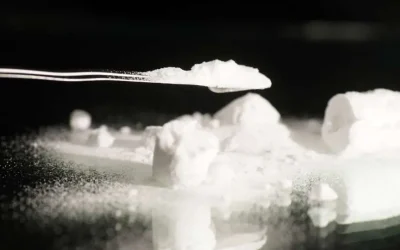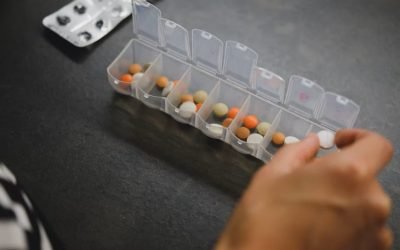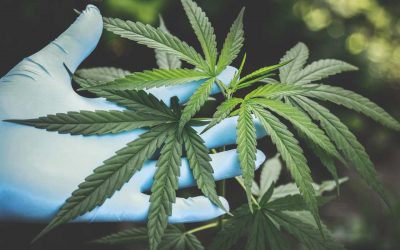Last updated: November, 2025
Amphetamines often start as a shortcut to energy, a way to stay awake, focused, or motivated when life feels too heavy to carry. But what begins as control soon turns into chaos. The body weakens, sleep disappears, and thoughts race endlessly.
Amphetamine addiction is not about failure or lack of willpower. It is the body’s reaction to overstimulation and exhaustion: a nervous system pushed too far.
Recognising this cycle is the first step toward healing. With the right care, it is possible to recover fully and rediscover calm.
What Are Amphetamines and Why They Become Addictive
Amphetamines are synthetic stimulants that act on the central nervous system. They increase dopamine and norepinephrine: chemicals linked to focus, motivation, and pleasure. For a moment, life feels easier: energy rises, appetite fades, confidence grows.
But when the effect fades, the crash comes hard. The brain demands more stimulation to feel balanced, and the mind becomes dependent. This is how amphetamine addiction begins: the pursuit of clarity that leads to depletion.
How Amphetamines Affect the Brain and Body
Amphetamines raise heart rate and blood pressure while keeping the brain in constant alert. Over time, this strain exhausts both body and mind. Users may experience anxiety, sleeplessness, muscle tension, and even crystal meth dependence if stronger stimulants enter the picture.
Prolonged stimulant use reduces natural dopamine production, impairing focus, motivation, and mood regulation. The immune system weakens, digestion slows, and cognitive clarity fades. This chemical imbalance is what sustains the cycle of use: the brain chasing stimulation it can no longer generate on its own.
Without intervention, the body forgets how to rest (a key aspect of stimulant addiction that requires professional treatment and long-term care).
The Illusion of Control: When Energy Turns into Exhaustion
At first, amphetamines seem to give control. Tasks feel simple, conversations flow, fatigue disappears. But beneath the surface, the body is losing balance. What feels like enhanced performance is actually borrowed energy.
As the body continues to burn through its reserves, sleep becomes fragmented, emotions unstable, and thinking erratic. The initial euphoria turns into anxiety and irritability, followed by deep crashes of sadness and fatigue. Eventually, the nervous system crashes, leaving behind emptiness, confusion, and depression. The illusion of energy fades, replaced by a deep and painful exhaustion. This is the point where support becomes not just helpful — but essential.
Recognising the Signs of Amphetamine Addiction
People living with amphetamine addiction often appear functional, busy, talkative, full of energy. But inside, there’s growing fatigue and anxiety. Recognising the symptoms early can save lives and prevent long-term neurological harm.
Physical Signs: Fatigue, Weight Loss and Sleep Disruption
The body’s reserves run out quickly. Weight loss, tremors, and insomnia are common. Many people experience irregular heartbeats and exhaustion after days without sleep.
Chronic use also leads to dehydration, skin issues, dental decay (“meth mouth”), and digestive problems. Over time, the immune system weakens, making the person more vulnerable to infections and chronic fatigue.
These physical consequences often appear gradually, which makes denial easy. But even subtle signs (persistent insomnia, reduced appetite, or trembling hands) can indicate a deeper issue requiring medical assessment and amphetamine addiction treatment.
Emotional and Behavioural Symptoms: Anxiety, Paranoia and Isolation
The psychological toll is equally heavy. Anxiety, paranoia, irritability, and emotional outbursts become frequent. Some users may develop obsessive thoughts or temporary psychosis due to overstimulation of the brain’s reward system. Relationships often deteriorate as trust erodes and emotional volatility increases. Once joyful people withdraw from others, driven by restlessness or fear.
Social isolation deepens the dependency: the less connected a person feels, the more the drug fills that void. Recognising these patterns early is crucial; asking for help is not defeat, but an act of strength.
Amphetamine Withdrawal and Detox
When stimulant use stops, the body begins to slow down; a process called amphetamine detox. The transition can be overwhelming, both physically and emotionally. Professional supervision ensures safety and emotional stability during this fragile time.
What Happens During Amphetamine Detox
During detox, the brain starts to rebalance dopamine levels. Fatigue, increased appetite, vivid dreams, and depression are common. Many describe the first days as “crashing”: sleeping for long periods, then waking with intense hunger and confusion.
This phase marks the beginning of recovery: the body’s way of returning to its natural rhythm. In clinical settings, medical detoxification for stimulants ensures hydration, nutrition, and rest, while gentle activity helps the body reconnect with its natural energy cycles. The goal is not just abstinence, but restoration.
Managing Anxiety and Depression During Withdrawal
Amphetamine withdrawal can intensify feelings of sadness, apathy, and anxiety. These emotions often reflect the brain’s recovery from overstimulation.
Therapeutic interventions (including cognitive-behavioural therapy, mindfulness, and group support) teach patients to manage emotional lows safely. Meditation, creative expression, and body-based therapies help calm the hyperactive nervous system that amphetamines once overstimulated.
Understanding how to recover from amphetamine addiction safely means addressing both body and mind: stabilising sleep, supporting nutrition, and reconnecting emotionally through guided therapy.
How Long Does Amphetamine Withdrawal Last
Many ask how long amphetamine withdrawal lasts. Physical symptoms often ease within one to two weeks, but emotional recovery takes longer.
Some individuals experience “post-acute withdrawal,” with fatigue, irritability, or depression reappearing sporadically for months. This is normal and treatable with professional support. Structured routines, gentle physical activity, and therapeutic guidance all contribute to steady recovery. Each day without stimulants allows the brain to rediscover its own natural calm.
Treatment for Amphetamine Addiction
Effective amphetamine addiction treatment focuses on restoring balance, not just ending use. The goal is to rebuild emotional strength, improve sleep, and address the psychological roots of dependency.
Dual Diagnosis and Mental Health Treatment
Many individuals facing stimulant dependence also struggle with anxiety, depression, or trauma. Dual diagnosis treatment for amphetamine users addresses these conditions together, preventing relapse and promoting holistic healing.
This approach recognises that addiction is often a coping mechanism: a way to manage stress or pain. Treating both issues simultaneously helps restore long-term stability and emotional resilience. Therapy may include trauma work, stress regulation, and skill-building to replace substance-driven motivation with self-awareness and purpose.
Inpatient vs Outpatient Rehab for Stimulant Addiction
An inpatient rehab for amphetamine addiction provides structure, distance from triggers, and continuous therapeutic support. In this environment, residents rebuild healthy habits, rest, and routine in a calm, medically supervised space. Outpatient treatment, by contrast, allows people to maintain work and family responsibilities while attending therapy and group sessions. This model supports gradual reintegration into daily life.
Both options can succeed when guided by empathy and consistency. The right choice depends on the individual’s history, environment, and level of dependency.
Holistic Therapies for Focus, Calm and Balance
Healing requires more than abstinence. Holistic therapies for stimulant addiction (including yoga, art, breathwork, mindfulness, and nutrition) help repair the connection between body and mind. They also reintroduce the idea of pleasure without drugs: finding satisfaction in creativity, movement, and connection. This emotional repair is often what makes recovery sustainable, turning treatment into transformation.
At Hacienda Paradiso, these practices complement psychotherapy and medical care, creating space for calm reflection. This integrative approach has established Hacienda Paradiso among the best amphetamine rehab centers in Spain.
Rebuilding Life After Addiction
Recovery from stimulant addiction is not just about quitting; it’s about learning how to live without constant overdrive: to rest, focus, and feel again.
Creating Restful Routines and Sleep Recovery
Sleep and structure form the foundation of recovery. Many people in recovery from amphetamine addiction must relearn how to rest. Establishing consistent routines (meals, movement, reflection) helps stabilise mood and improve focus.
At Hacienda Paradiso, aftercare programs teach residents how to listen to their body’s signals again. Over time, this restores natural energy and concentration, replacing chaos with quiet confidence. This process is central to long-term recovery support and helps prevent relapse.
Emotional Regulation and Self-Awareness
Therapy helps individuals identify their triggers (pressure, fatigue, or perfectionism) and develop healthier responses. Through mindfulness and emotional education, recovery becomes not just abstinence, but growth.
Self-awareness allows people to recognise when they’re overwhelmed before reaching for stimulants. Over time, this emotional literacy builds resilience and calm — the real antidote to addiction.
Long-Term Support and Relapse Prevention
Addiction recovery continues long after the initial phase. Ongoing counselling, aftercare programs in Spain, and peer support groups provide structure and accountability.
Relapse prevention planning helps individuals recognise early warning signs and respond constructively. Recovery is not perfection — it’s progress, built one steady day at a time.
Healing in Spain: Restoring Mind and Body Balance
Spain has quietly become one of the most trusted destinations for private rehab for amphetamine addiction in Europe. Its slower pace, open landscapes, and Mediterranean light help the nervous system recover from years of overstimulation. The climate encourages sleep, reflection, and reconnection with the body’s natural rhythm.
Beyond its environment, Spain’s healthcare culture emphasises dignity, privacy, and compassion. Recovery here feels personal, calm, and deeply human — a blend of science and serenity that supports the entire person, not just the diagnosis.
The Hacienda Paradiso Approach: Clinical Calm and Human Care
At Hacienda Paradiso, this philosophy becomes reality. Set in the Andalusian countryside, the centre combines clinical precision with emotional intelligence. Treatment includes medical detoxification for stimulants, dual diagnosis care, and holistic therapies designed to rebuild physical health and inner balance. Each programme is tailored to the individual, guided by empathy and discretion.
Here, recovery is not about restriction; it’s about restoration. The body slows, the mind steadies, and life begins to breathe again, safely, quietly, and with purpose.
Taking the First Step
If you wonder how to recover from amphetamine addiction safely, know that help exists. At Hacienda Paradiso, recovery is not punishment, it is care. It is a space to rest, to heal, and to find clarity again. The process is private, gentle, and deeply human: where science meets serenity and every breath feels like renewal.
You do not have to face amphetamine addiction alone. Request more information.
Frequently Asked Questions: Amphetamine Addiction
Amphetamine addiction develops when the brain becomes dependent on artificial stimulation to maintain focus or energy. At first, amphetamines boost dopamine and norepinephrine: chemicals linked to motivation and alertness. Over time, the brain adjusts to this overstimulation, losing its natural ability to regulate energy and mood. What begins as occasional use to study, perform, or stay awake can quietly turn into dependence, emotional exhaustion, and anxiety.
The signs of amphetamine addiction can be both physical and psychological. Physically, people may experience rapid weight loss, tremors, irregular heartbeat, or chronic insomnia. Emotionally, anxiety, irritability, paranoia, and social withdrawal are common. Many also develop obsessive thoughts about productivity or control. Recognising these symptoms early (especially growing restlessness or fatigue despite drug use) is key to seeking help and beginning recovery.
Withdrawal usually begins within hours after the last use. The first few days bring fatigue, increased appetite, and vivid dreams; the body’s natural “crash” as it restores chemical balance. Physical symptoms of amphetamine withdrawal often ease within one to two weeks, but emotional effects such as depression, cravings, and low motivation can last longer. Structured care, nutrition, and medical detoxification for stimulants help manage these changes safely.
Effective amphetamine addiction treatment combines medical, psychological, and holistic therapies. Inpatient rehab provides a structured environment for rest and focus, while outpatient programs allow flexibility and continued personal commitments. Dual diagnosis treatment for amphetamine users is crucial when mental health conditions like anxiety or depression coexist. Holistic practices (mindfulness, yoga, and balanced nutrition) support recovery by calming the nervous system and restoring clarity.
Yes, recovery is absolutely possible. The process begins with detox and continues through therapy, self-awareness, and lifestyle rebuilding. Learning how to recover from amphetamine addiction safely means developing routines that restore rest and stability while addressing the emotional patterns that sustained the addiction. Long-term recovery is sustained through therapy, peer support, and personalised aftercare programs in Spain that nurture balance and prevent relapse.
Spain has become a leading destination for private rehab for amphetamine addiction in Europe. Its calm landscapes, sunlight, and slower rhythm of life help restore both body and mind. The country’s rehabilitation centres combine clinical expertise with compassion and privacy, qualities that make recovery feel personal and dignified. At Hacienda Paradiso, this harmony between science and serenity creates an environment where true healing can begin.









